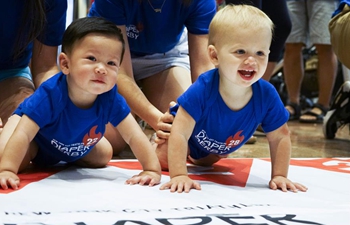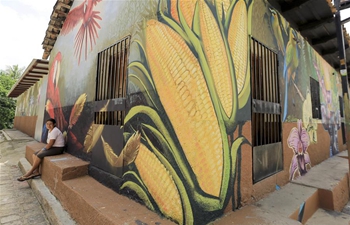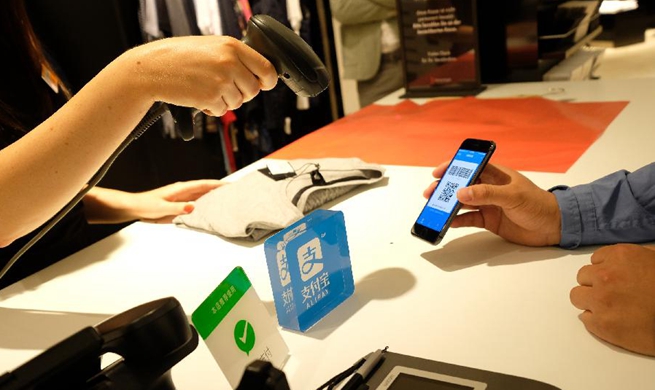by Xinhua writer Wang Jian, Ruan Zhouwei
BEIJING, June 30 (Xinhua) - Wu Xuefang calls the back of the bicycle shed downstairs a "battlefield" where he fights for the Party and the people.
It is there that Wu, 77, has created a streetside information center consisting of bulletin boards, chalkboards and pictures using wood, glass and picture frames he has collected from the garbage.
On the boards, he writes down information about current affairs, thoughts and history of the Communist Party of China (CPC), and other things from military news to health tips.
It has been especially hot in Beijing these days, but Wu stands in front of his bulletin boards for hours despite the scorching sun. He is working on a special "column" to mark the 97th anniversary of the CPC on July 1.
Wu, once a member of the air force, joined the CPC in the 1960s, just as Chairman Mao called on the people to learn from Comrade Lei Feng, a soldier renowned for his generosity and altruistic deeds.
Wu found the calling dear to his heart, and he sticks to it to this day.
While serving in the army, he offered free haircuts for soldiers. For 16 years, he has been well known among neighbors for his volunteer work on the bulletin boards.
In a locked drawer, Wu keeps a small notebook he received from his middle school teacher 58 years ago. On the first page the teacher wrote, "Xuefang, never stop helping others."
Born in Beijing's Miyun County, Wu started cutting hair as a teenager. He found it satisfying to help schoolmates with their hair.
The notebook was a reward for his helpfulness.
"I never let my teacher down," he said.
For half a century, he kept his barber's tools on him. Even on trips while in the military, he would offer free haircuts to passengers on the train.
After he retired in 2001, Wu and his wife moved to the residential area where he still lives today, in Beijing's Daxing District.
He set up a haircut stall near the bicycle shed. For old or disabled customers, he makes house calls.
At the beginning he refused to charge, but many people said they would be too embarrassed to come if he did not charge. So, he charges three yuan (45 U. S. cents) or five yuan for each haircut.
It was mere happenstance that turned the barber into a one-man news gathering and distribution service.
One day 16 years ago, Wu and his wife found some wooden boards abandoned in the street. "It was a shame to throw them away. Why not turn them into an asset?" he said.
Then he fixed them to the back of the bicycle shed, and wrote in chalk some thoughts about haircutting and health.
"What a good way to amuse my customers!" he said.
The chalkboards attracted ever more people to his stall, and Wu developed a habit of collecting waste: windows, doors, picture frames.
Gradually, a gallery stretching some 20 meters evolved.
When people told him that the bulletin boards were even better than a newspaper, he beamed.
In 2016, Wu broke his leg, and that was the end of his haircutting career. He started to put all his energy into the bulletin boards.
"No matter through haircuts or bulletin boards, as long as it helps, I will be happy," he said.
He became a newshound -- following the latest stories and obsessively updating content.
Every day, in addition to reading newspapers and watching TV news, he lies in bed reading the news on his cell phone and making notes.
Over the years, those notes have amounted to more than 30 big volumes.
"When there is big news such as the 'two sessions,' I have to update more frequently," he said. "People always want the latest news, right?"
In order to create a better environment for others to enjoy the bulletin boards, he planted flowers and fruit trees in the area. He also collected some old chairs and tables.
"In case they want to take a rest, or if they have some suggestions, we can have discussions here," he said.
Needing even more chairs, he rode a tricycle to a construction site and took some waste cement to build 10 square cement block chairs.
Neighbors have joined Wu's efforts. Some have donated boxes of chalk. Some have donated picture frames and flower seeds. Others bring him useful treasures they discover in the garbage.
In the beginning, Wu stuck pictures cut from newspapers directly onto the boards, but they were too fragile to withstand the rain and wind. Then his daughter bought him a printer and a laminator.
Once a neighbor volunteered to help him with the writing, but he refused. "The content has to be made all by myself. It has to be my own style," he said.
Every morning after breakfast, he goes downstairs to a big table near the bulletin boards, cutting newspapers, writing notes or just sitting there looking at the street.
When passersby stop to read the boards, he invariably takes pictures of his readers.
He sends pictures through Wechat every day, some about his updated bulletins, some of people reading the boards.
"Each time I send pictures online, I get a dozen thumbs-up," he said proudly.
Some have asked Wu how long he plans to continue with his news quest. His answer? Until the day he can no longer move.
"This is a ground I will defend to the very end."

















